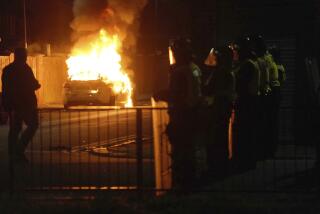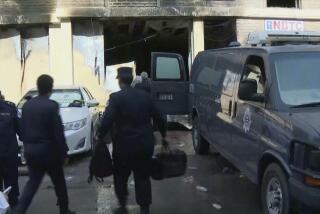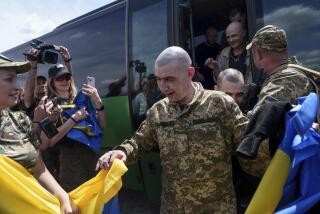Britain returns control of Basra to Iraq
During a low-key ceremony Sunday, Britain formally handed over control of security responsibility for Basra province to Iraqi authorities, marking a significant step toward full Iraqi sovereignty.
“This day is a big day in the history of Basra and the history of Iraq,” Iraqi national security advisor Mowaffak Rubaie told a group of at least 100 dignitaries and other guests gathered in the arrival lounge at the Basra airport. “It is a huge test for the Basrawis to be in charge . . . to determine their own fate and to rebuild the city.”
Basra is the last of four southern provinces under British control to be given back to the Iraqis. Britain had already pulled its troops out of Basra city to the outlying airport and is expected to draw down the remaining 4,500-member force to about 2,500 by spring. They will enter the city, Iraq’s second-largest, only if a crisis occurs that exceeds the capacity of the Iraqi forces, British officials said.
“I came to rid Basra of its enemies, and I now come to hand back Basra to its friends,” said Maj. Gen. Graham Binns, the British general officer commanding.
Binns led British troops when they first arrived in Basra in 2003, and on Sunday he joined Basra Gov. Mohammed Waili in signing a Memorandum of Understanding marking the transfer. Violence in Basra has abated to a manageable level, British military officials said, allowing for the move.
But the fact that the ceremony was held not in the city, but in an airport lounge with signs for “international baggage claim” and “passport control” leading to the venue, underscored the state of security in town.
The British have touted their withdrawal as an indication of the calmer situation and point to the transfer to Iraqi security forces as a model for establishing stability elsewhere in Iraq. They say the strategy has forced the provincial government to take charge and push warring Shiite Muslim militias to reconcile.
“Basra security institutions have proven that they are capable,” Binns said, adding that the British would continue to train the province’s security forces.
“Our help will continue to be one of assistance, not interference; to support, not to direct; to listen, not to ignore,” Binns told the attendees. “This will be achieved by actions, not just by words. This is our promise to you, the people of Basra.
“As you step up, we set back,” Binns added.
U.S. Army Lt. Gen. Raymond T. Odierno, day-to-day commander in Iraq, told reporters Sunday in Baghdad that the United States would be ready to respond to requests for help if needed, from Iraqi security forces or the British forces. But he indicated that this would be limited to providing air support and intelligence.
“We will not intervene independently of the government of Iraq,” Odierno said. “If they could not handle the problem in Basra, they would come to us and ask us for assistance.”
But U.S. officials remain skeptical that Basra can serve as a model for the nation because Basra has a largely homogenous Shiite population, whereas other areas are home to both Shiites and Sunni Arabs.
In recent months, the oil-rich south has seen sporadic fighting between rival Shiite factions vying for power. The violence has included the slaying of two governors and a number of senior security officials, and car bombings that killed at least 28 people in Maysan province Wednesday.
The battle for political supremacy has been mainly between three rival Shiite groups: The Mahdi Army of popular anti-U.S. cleric Muqtada Sadr, the Supreme Islamic Iraqi Council’s Badr Organization, which controls law enforcement across much of the south, and the smaller Fadila al Islamiya party.
Vali Nasr, a senior fellow at the Council on Foreign Relations and a professor at the Fletcher School of Law and Diplomacy at Tufts University, said maintaining the peace in Iraq’s south would depend largely on “what Iran can and will do.”
“Iran has ties with Mahdi Army and the Badr Corps, as well as Fadila party in Basra,” Nasr said, adding that Iran has so far kept the warring factions in a truce, therefore helping keep Basra under control.
But “the potential for fighting is great if Iran loses control or decides to change strategy,” he said. “Basra is a test of Iranian influence and intentions. That is a critical factor.”
British military officials have acknowledged that they have been talking with Sadr’s militia -- considered to be the most powerful of the factions -- in hopes of bringing the group into the political process in Basra.
Khudair Moussawi, 43, a member of Sadr’s party who attended the ceremony, said that his group was ready to work with the government “to reconstruct our city” and that he was hoping for “development and peace.”
Moussawi dismissed claims of Iranian influence in Basra.
Tribal leader Mohammed Zaidawi, who attended the gathering with an entourage of fellow sheiks, blamed the killings and kidnappings on security forces and not on tribal militias.
In town, opinion was mixed about the security status.
Maj. Gen. Abdul Jalil Khalaf, police commander of Basra, said he did not expect an escalation in violence because Iraqi forces have been in control of the city since Britain started its troop pullout in September.
Khalaf said he felt confident because the warring factions had disavowed violence and were preparing for this year to be “a year of stabilization and reconstruction.”
“There are no militias controlling the streets of Basra anymore,” Khalaf said. “Now, only the law and security forces have control over the streets.”
Basra resident Abduljaleel Abdulhafidh Salim, 50, a Sunni who works as a temporary guard at the oil installations, said security was “good but not excellent.”
He said he expected the British withdrawal to be better for Basra, particularly for those who lived close to where British troops had been based, because militants used to shell the positions.
But some residents said that Shiite infighting had spawned an intolerable environment of fear and that they were anxious about the British leaving.
“When I walk the streets, I don’t feel secure,” said a 42-year-old Shiite civil servant, who requested anonymity for fear of reprisal. “I don’t stay out late because of this. The British didn’t kill anybody. . . . The British didn’t kidnap anybody.”
Another troubling factor for some Iraqis is the seeming rise of religious conservatism and extremism in Basra, which had been known for vibrant night life and religious tolerance.
Since the 2003 U.S.-led invasion of Iraq, Islamic fundamentalism here has led to the repression of secular activities, with extremists forcing the closure of music shops, liquor stores and barbershops. Lately, police in Basra have reported that dozens of women have been slain by vigilantes because they had on makeup and were not wearing traditional Islamic head coverings.
The reports have included horrific accounts of mutilations and beheadings. The accounts could not be independently confirmed, but local and international human rights groups said they had heard of such killings from police authorities.
Rights activists said that little had been done to stop such violence.
But Khalaf, the police official, was insistent that Iraqi law enforcement would tackle all types of crime. “We have a huge task ahead of us,” said Rubaie, the national security advisor, responding to concerns that many people still do not trust Iraqi security forces. He said great strides had been made in rooting out “bad elements” in the police force.
“We are yet to declare victory,” Rubaie added. “We are on the right track, and every week and every month we are gaining strength. These problems cannot be solved overnight.”
Elsewhere in Iraq today, a bomb targeting a U.S. army convoy in Baghdad missed, instead hitting two civilian cars and killing two people, police said. Four others were injured.
A truck bomb parked on a bridge connecting the first and second gates of the Mosul dam exploded, killing a security protection service office, according to local security officials.
Meanwhile, the presidency of Iraq’s parliament condemned Turkey’s raids against Kurdish guerrillas in northern Iraq on Sunday, saying the Turkish planes that bombed several Iraqi villages killed many innocent people.
Iraqi Foreign Minister Hoshyar Zebari told reporters at a briefing in Baghdad that Turkey’s ambassador to Iraq had been summoned.
“We explained our position to them and we had some understanding that any such action needs to be coordinated between the two governments,” Zebari said. “But we hope actually that this would be contained and it would not be repeated.”
U.S. officials in Baghdad would not comment on the airstrikes.
Times staff writers Tina Susman, Raheem Salman and Wail Alhafith in Baghdad and a special correspondent in Basra contributed to this report.
More to Read
Sign up for Essential California
The most important California stories and recommendations in your inbox every morning.
You may occasionally receive promotional content from the Los Angeles Times.










